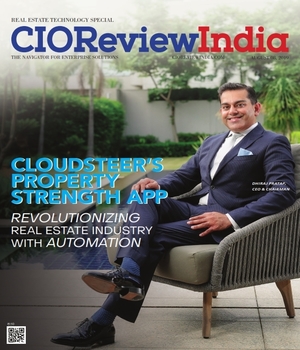
Real Estate Industry Undergoing strategic shift in digital adoption
Deveshri Patel, Head of Information Technology, Adani Realty | Tuesday, 16 August 2022, 13:51 IST
 Deveshri Patel, Head of Information Technology at Adani Realty in an interaction with CIO Tech Outlook, brings to light the progress of real estate industry in terms of technology adoption. In the interaction, she also explains the importance of data analysis, technology integration, and more.
Deveshri Patel, Head of Information Technology at Adani Realty in an interaction with CIO Tech Outlook, brings to light the progress of real estate industry in terms of technology adoption. In the interaction, she also explains the importance of data analysis, technology integration, and more.
The global IT market in real estate is expected to reach a value of USD 13.46 billion, by 2026. How do you see this market developing in India? What will be the key factors driving the growth?
The arrival of IT to India’s realty sector maybe a little late, but a definitive and positive push in the real estate sector will definitely come by. The key factors in its growth and emergence are likely to be digital adoption by all three entity sets involved in the section – i.e.buyers, sellers and regulators. The biggest area where we are likely to see growth of IT in real estate is in the Proptech usage wherein the three entity sets will converge.
According to global data, 62 percent of purchasers utilize digital tools for product research, and by 2030, this proportion will approach 90 percent. With the rising migration of purchasers to the digital domain, how is the real estate industry's business strategy evolving?
With real estate purchasers adopting digital tools for buying, the industry is also making a strategic shift in digital adoption. The developers and sellers are leveraging data and analytics to better learn and understand the consumer’s needs and behaviour. The Real estate industry is focusing on providing the consumer with an experience rather than just an asset.The industry is adopting and implementing solutions like AR/VR aided walkthroughs, using streaming data and notification applications to give live updates during development, provide better reach and connectivity to the property using technology and digital solutions with GPS enabled transport, enable flexible layout of interior, sold space area, fast turn-around in construction and civil work with complex prefabricated designs and providing the convenience to access everything with a few taps through mobile applications, etc.
In an ideal world, every real estate company wants all its data to be connected and cleaned to generate insights faster. However, with problems like lack of standardization, complex privacy regulations, and lack of a comprehensive data strategy, companies find it challenging to gather and analyze data. How do you propose to overcome this scenario?
In IT, ideal worlds last only a short while and more so in Realty related IT. Data issues will always be there. We need to continuously work on data through processes and discipline to set it right and maintain it. A healthy data culture, belief in data strategy, data-oriented solutions and backing a strong data governance program go a long way in making the processes work and ensuring that data culture is inculcated. Once the building block is in place, the subsequent steps are easier. It also helps if not just the organization but its partners, vendors and collaborators – industry, government bodies are enrolled and connected via a data culture program. However, this is easier said than done and needs years of effort. Like always, innovative and new age technology solutions (like blockchain and data fabric) can be employed to solve some of these challenges.
A major impediment that most real estate organizations face is cultural rather than technology. After all, breaking through the barriers that divide the stakeholders is a challenging undertaking. What role does a CIO have in dismantling the silos? How do you undertake this situation?
Communication & inclusivity is the key. Let IT and project related updates and information flow not just vertically but laterally as well – within the Realty business and also at the corporate group level and extend wherever required with the trusted vendors and outsourcing partners. As an IT head– I follow the communication and information sharing practice across the board; additionally, I try to ensure that no project is an IT project but actually a “business” project, this ensures that eventually people connect better, work together and achieve together.
CSR programs for awareness & upliftment of the community, children, and youth bring the people of the organization together and bond; such connects in turn ease the day to day professional interaction between the employees and various stakeholders.
New technologies such as digital twins, augmented reality, and virtual reality are now being used in the real estate sector. With the introduction of these new technologies, flawless integration with the existing system is critical in order to prevent the possibility of lower user efficiency. How can this be achieved?
A lot goes into the making to ensure that “Integration between IT systems” happens. The integration mindset needs to operate at all three levels – Plan, Build and Operate. When IT systems are being planned, one needs to think how will they integrate during the Build phase and how scalable and maintainable will be those interfaces and integrations.
The approach best suggested is “Integration by Design”; this provides a consistent and streamlined process for technology evaluation (Plan), integration (Build) and deployment (Operate) in the IT ecosystem.
Another aspect of integration is using technology solutions and products which offer open standards rather than super-specialized proprietary interfaces.
How do you see the future of the real estate Tech market developing in India?
India has always been a price sensitive and value conscious market, more so in the fixed assets and property space. The onus I believe will be on the seller side to initiate the cycle - Accept, adopt and practice technology, make technology a part of (working) life.
As I mentioned earlier – solutions like AR/VR aided walkthroughs, usage of streaming data and notification applications to give live updates during development and construction, GPS enabled transport and services, drone camera based surveys and assessments, 3D printing in construction and civil work and understanding customer behavior and preferences by using ML based solutions on their demographic data are likely to be the high points for IT in the Realty sector.
CIO Viewpoint
Real Estate Industry Undergoing strategic shift...
By Deveshri Patel, Head of Information Technology, Adani Realty
Enhancing Operational Efficiency in Real Estate
By Abhrasnata Das
How Data Analysis Is Shaping The Proptech...
By Aamer Azeemi, Chief Innovation Officer at RMZ Corp
CXO Insights
Latest Construction Technology Trends
By Deepak Suvarna, Chief Projects Officer, Mahindra Lifespace Developers Ltd
By Gurjot Bhatia, Managing Director, Project Management, CBRE India
Digital Employees: The Rising Stars Of India







